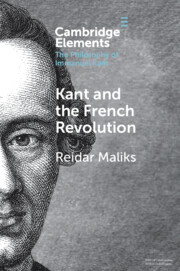Element contents
Kant and the French Revolution
Published online by Cambridge University Press: 04 February 2022
Summary
- Type
- Element
- Information
- Online ISBN: 9781108529723Publisher: Cambridge University PressPrint publication: 03 March 2022
References
- 10
- Cited by

